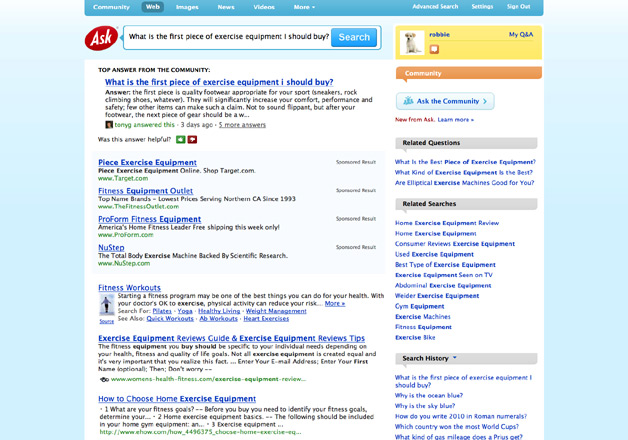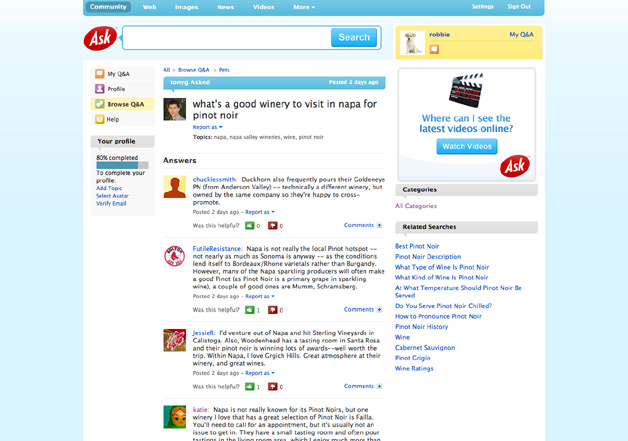We’ve known that Ask has been working on a new version of Ask.com for months, but now it’s here. Ask is placing new emphasis on the Q&A side of search, and is injecting the Q&A experience directly into the main search experience, which is what SVP of Product Management Tony Gentile tells WebProNews, sets the new Ask apart from other Q&A sites.
He says they’ve taken a hybrid approach, utilizing existing partnerships and new technology that’s been refined over the last six to nine months, to build a new social Q&A experience that’s built directly into Ask’s search capabilities. When Ask doesn’t immediately give you an answer (or the right answer), you can simply ask "the community."
We asked Gentile to tell us a little about who this community is. Initially, he says, they are using their existing employee base across IAC companies in a private beta. These employees are encouraged to invite their own families and friends to participate. Some journalists have been invited as well. Eventually this will expand. He says they will also implement technologies like Facebook Connect, Twitter, LinkedIn, OAuth, etc. to get users to bring in people from their own networks.
Also as a result of the social media aspect, he says profiles can lend credibility to answers. For example, if you answer a question and your LinkedIn profile is attached to it, that can show your experience in a field related to a question you have answered.
This is where the new Ask.com comes in as a potentially useful tool for businesses. Businesses may want to answer questions about products, and even create relationships with potential customers. An interesting nugget Gentile shared is that in analyzing the questions Ask receives, the majority of them are either related to "how do I spend my time?" or "how do I spend my money?"

Ask has the ability to work at the local level, as well. Gentile says they have the ability to analyze questions of both an implicit and an explicit local nature. For example, if someone asks, "what’s the best burrito shop in San Francisco?", that’s clearly a local question, and they can route it accordingly to people in and who have visited San Francisco.
Another type of local question, however, is something like "who’s a babysitter I can trust?" That’s also a local question, but it doesn’t name a specific city. Ask says it has the ability to figure it out, and again, route accordingly. It calls upon signals in the user profiles. If a user gives permission, they will use location.
Here are the main features of the new Ask.com (as described by the company):
– Proprietary semantic search technologies: Finds the most relevant, quality answers across the Web, and displays them at the top of the page. No click-throughs required.
– The largest Q&A database on the Web: More than 500 million questions and answers indexed, and the ability to quickly extract Q&A pairs from hundreds of thousands of sources.
– Ask.com community: Leverages proprietary search categorization to route questions and solicit high-quality answers from community members based on their interests and areas of knowledge.
– New user interface: Improved UI makes it easy to ask and answer questions, highlights advancing and trending questions from the Ask community throughout the site.

"Ask’s heritage has always been about answering questions – in fact, more people associate Ask with answering questions than any other brand in the world," says Ask.com U.S. President Doug Leeds. "As users continue to embrace the social Web, now is the perfect time to extend Ask’s technology beyond finding pages that have answers to finding people who do as well. With 87 million monthly users and more than a decade of Q&A experience, Ask.com is uniquely positioned to answer the long tail of questions that are impossible for search engines alone to address."
It’s worth noting that Google purchased Aardvark not too long ago, which also calls upon a community to answer questions, but the company’s plans for the service are still somewhat unclear. It remains to be seen if that will become fully integrated with the search engine.
"As the Web becomes more conversational in nature, consumer expectations and the Web’s ability to meet those expectations are changing rapidly. It has become natural for people to ask questions and receive answers online, and algorithmic search alone can only take that proposition so far,” says Allen Weiner, Research VP, Media Industry, Gartner Research. "There is a huge market opportunity for companies who can get this right."
While they don’t have any specific announcements yet, Ask has a roadmap for new directions in which they plan to take the new Ask.com, in terms of social and mobile. These could be key elements in just how successful this relaunch is.
